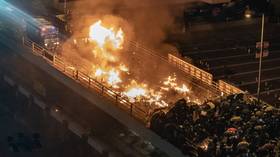7th Symphony – inspiration to besieged Leningrad
Composer Dmitry Shostakovich, who witnessed the horrific Siege of Leningrad, wrote his legendary 7th Symphony in the first year of the war. The symphony has become a symbol of resistance and the will for victory.
More than 600,000 people died of hunger in the blockade of city of Leningrad – now known as St. Petersburg. Shostakovich’s music was written to inspire the city under siege.
“My 7th Symphony was based on the formidable events of 1941,” the composer said on an archive tape. “I dedicated my composition to the struggle against fascism, our forthcoming victory and my native city of Leningrad.”
Shostakovich was in Leningrad in September 1941 when the Nazi noose was tied. He witnessed the city’s suffering and immediately began to compose his 7th symphony.
On the 9th August, 1942, Galina Lelyukhina played clarinet as the starving musicians of the Leningrad Radio Orchestra gave an unforgettable performance of the music.
“The Germans had announced to the entire world that Leningrad was a city of the dead, and the dead were walking around,” Lelyukhina recalls. “But then there came such powerful music, especially the part which describes the invasion of Germans. This was very impressive!”
Shostakovich completed the symphony after he was evacuated from Leningrad, and it was performed throughout the Soviet Union to boost morale. The decision to stage it in the besieged city seemed totally unrealistic. The score had to arrive by plane, taking a perilous route over Nazi lines. The orchestra only had 15 musicians left following the devastating winter of 1941, with over 100 needed. The call went out for more.
“They said on the radio that all living musicians were invited,” Galina Lelyukhina remembers. “It was hard to walk. I was sick with scurvy, and my legs were very painful. At first there were nine of us, but then more people arrived. The conductor Eliasberg was brought on a sledge, because hunger had made him so weak.”
Men were even drafted in from the frontline, swapping instruments of war for musical ones.
The symphony demands huge physical effort, especially from the wind section – a struggle for a city already gasping for air.
“During the first rehearsal, some musicians physically could not make it to the second floor – they listened from the first floor,” says historian Viktor Kozlov. “That’s how exhausted they were from hunger. You cannot imagine now this level of starvation. People could not sit, they were so thin – they had to stand during rehearsals.”
Although it was the height of summer, the musicians’ hunger was so acute they had to wear winter clothes to play in. The hall was packed with people, the windows and doors were opened so those gathered outside could hear, and the music was even broadcast on the streets to inspire the whole city.
“This symphony had a huge impact on us,” tells Irina Skripacheva, a blockade survivor. “The rhythm incited a feeling of elevation, flight. “At the same time we could feel the scary rhythm of the German hordes. It was unforgettable and overwhelming.”
The Germans planned to disrupt the performance with an artillery accompaniment to crush the spirit the music was fueling.
The Soviet Army countered this by unloading 3,000 shells over the enemy, silencing its guns for the two hours needed for the concert.
It was broadcast to the fronts, cutting through the silence with deafening effect.
“On hearing the music, one German soldier wrote: ‘We realized we were going to lose the war, because we felt your strength was capable of overcoming famine, fear and even death’,” Viktor Kozlov relates.
The performance of Shostakovich’s 7th Symphony was the pinnacle of a starving city’s defiance. It gave a city on the brink of death the hope it so desperately needed.












